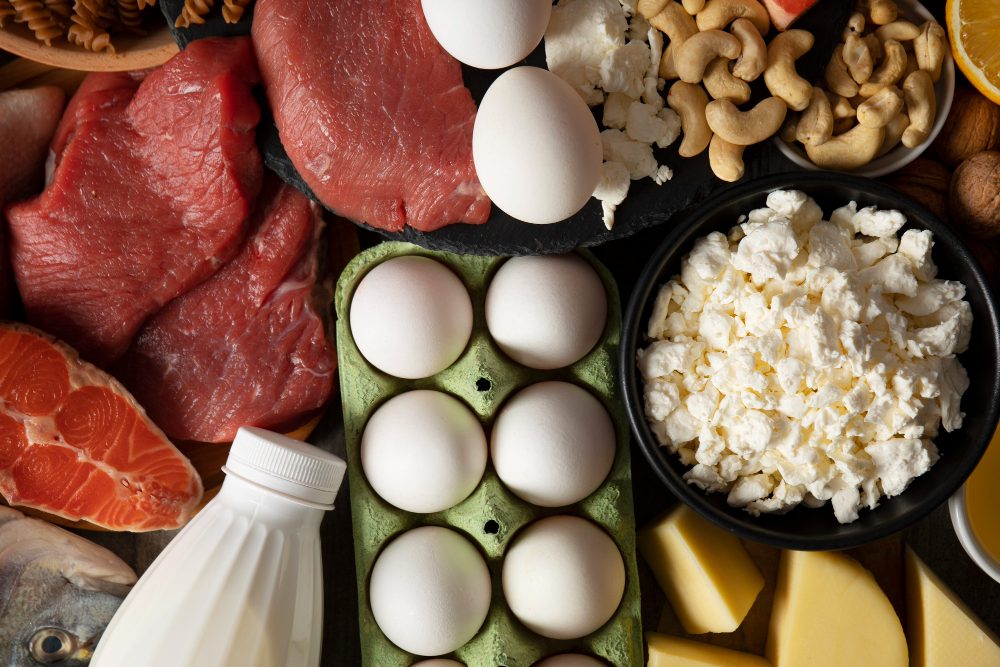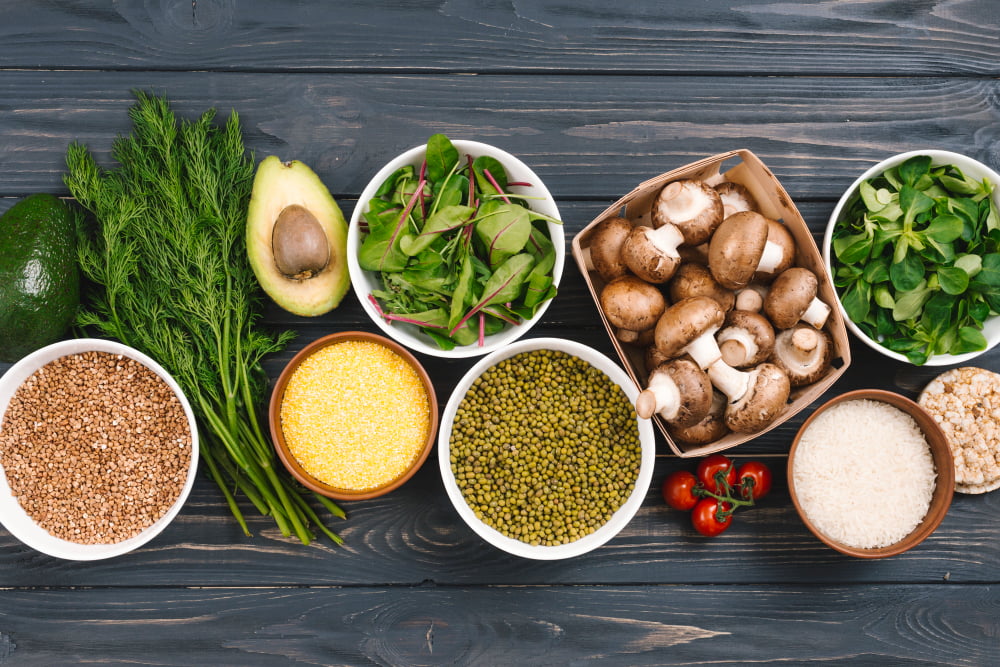Protein is an essential nutrient that plays a crucial role in building and repairing tissues, supporting immune function, and promoting overall health. Whether you follow a plant-based diet or include animal products in your meals, there are plenty of protein-rich foods to choose from. In this article, we will explore the top 10 protein-rich foods that can boost your nutrition and help you meet your daily protein needs.
Key Takeaways
- Lean meat, such as chicken and turkey, is a great source of high-quality protein.
- Fish and seafood are not only rich in protein but also provide omega-3 fatty acids, which are beneficial for heart health.
- Eggs are a versatile protein source that can be enjoyed in various ways, such as scrambled, boiled, or as an ingredient in baked goods.
- Dairy products like milk, yogurt, and cheese are not only rich in protein but also provide important nutrients like calcium and vitamin D.
- Legumes, such as beans, lentils, and chickpeas, are excellent plant-based sources of protein and also contain fiber and other beneficial nutrients.
Animal-Based Protein Sources

Lean Meat
Lean meat is a great source of protein and essential nutrients. It is low in fat and high in protein, making it an excellent choice for those looking to build muscle or maintain a healthy weight. Some examples of lean meats include chicken breast, turkey, and lean cuts of beef. These meats are not only delicious but also provide important vitamins and minerals like iron and zinc.
When preparing lean meat, it’s important to cook it properly to ensure food safety. Make sure to cook it to the recommended internal temperature to kill any harmful bacteria. You can grill, bake, or sauté lean meats for a healthy and flavorful meal.
If you’re following a specific diet, such as a low-carb or paleo diet, lean meat can be a staple food. It provides a good amount of protein without adding excessive carbohydrates. Incorporating lean meat into your meals can help you meet your daily protein needs and support your overall health and fitness goals.
Fish and Seafood
Fish and seafood are excellent sources of protein and essential nutrients. They are low in saturated fat and high in omega-3 fatty acids, which are beneficial for heart health. Salmon is particularly rich in omega-3 fatty acids and is a great choice for those looking to boost their nutrition. Other types of fish such as tuna and sardines are also high in protein and omega-3s.
Including fish and seafood in your diet can provide a variety of health benefits. They are rich in vitamins and minerals, including vitamin D, vitamin B12, and iodine. These nutrients are important for maintaining a healthy immune system, supporting brain function, and promoting thyroid health.
To incorporate fish and seafood into your meals, you can try grilling, baking, or steaming them. They can be enjoyed as a main dish or added to salads, soups, or stir-fries. Remember to choose sustainable and responsibly sourced options to minimize the impact on the environment.
Eggs
Eggs are a versatile and nutrient-dense food that can be enjoyed in various ways. They are an excellent source of protein, providing all the essential amino acids our bodies need. In addition to protein, eggs are also rich in vitamins and minerals, including vitamin B12, vitamin D, and selenium.
When it comes to cooking eggs, there are numerous options to choose from. You can enjoy them boiled, poached, scrambled, or even as an ingredient in baked goods. Eggs can be a great addition to your breakfast, lunch, or dinner.
Here are some key nutritional facts about eggs:
| Nutrient | Amount per 100g |
|---|---|
| Protein | 13g |
| Fat | 11g |
| Carbohydrate | 1.1g |
Tip: To ensure the eggs you consume are of high quality, opt for organic or free-range eggs whenever possible. These eggs are typically produced by hens that have been raised in a more natural and humane environment.
Dairy Products
Dairy products are a great source of protein, especially for those who follow a vegetarian or vegan diet. Milk, cheese, and yogurt are all rich in protein and can be easily incorporated into meals and snacks. Additionally, dairy products are also a good source of calcium, which is important for maintaining strong bones and teeth.
Here are some examples of the protein content in common dairy products:
| Dairy Product | Protein Content (per 100g) |
|---|---|
| Milk | 3.4g |
| Cheese | 25g |
| Yogurt | 3.5g |
Including dairy products in your diet can help you meet your protein needs and provide other essential nutrients. However, it’s important to choose low-fat or reduced-fat options to keep your overall saturated fat intake in check.
Tip: If you’re lactose intolerant or prefer plant-based alternatives, there are many non-dairy options available, such as almond milk, soy milk, and coconut yogurt.
Plant-Based Protein Sources

Legumes
Legumes are a great plant-based source of protein. They are not only rich in protein but also high in fiber, vitamins, and minerals. Beans are one of the most popular legumes and come in various types such as black beans, kidney beans, and chickpeas. They are versatile and can be used in a variety of dishes like soups, salads, and stews.
In addition to beans, lentils are another nutritious legume. They are packed with protein, iron, and folate. Lentils are easy to cook and can be added to salads, curries, or used as a meat substitute in dishes like lentil burgers.
If you’re looking for a gluten-free option, peas are a great choice. They are low in fat and high in protein, fiber, and antioxidants. Peas can be enjoyed in dishes like pea soup, stir-fries, or even as a side dish.
Including legumes in your diet is a fantastic way to boost your protein intake while also benefiting from their nutritional value.
Quinoa
Quinoa is a versatile and nutritious grain that is rich in protein. It is a complete protein source, meaning it contains all nine essential amino acids that our bodies need. Quinoa is also high in fiber, which can aid in digestion and promote feelings of fullness. Additionally, it is a good source of iron, magnesium, and phosphorus.
- Quinoa is easy to incorporate into your diet and can be used as a substitute for rice or pasta.
- It can be enjoyed in salads, soups, or as a side dish.
- Quinoa is gluten-free, making it a great option for those with gluten sensitivities or celiac disease.
If you’re looking to increase your protein intake, consider adding quinoa to your meals. It’s a nutritious and delicious option that can help support your overall health and well-being.
Nuts and Seeds
Nuts and seeds are excellent sources of plant-based protein. They are also packed with essential nutrients such as healthy fats, fiber, vitamins, and minerals. Including a variety of nuts and seeds in your diet can provide numerous health benefits.
Almonds are a popular choice when it comes to nuts. They are rich in protein, fiber, and vitamin E. Almonds can help lower cholesterol levels and reduce the risk of heart disease.
Chia seeds are tiny powerhouses of nutrition. They are loaded with protein, fiber, omega-3 fatty acids, and antioxidants. Chia seeds can help improve digestion, promote weight loss, and support heart health.
Here is a table comparing the protein content of different nuts and seeds:
| Nut/Seed | Protein Content (per 1 oz) |
|---|---|
| Almonds | 6 grams |
| Chia seeds | 4 grams |
| Walnuts | 4 grams |
Including a handful of nuts and seeds in your daily diet can be a great way to boost your protein intake and improve your overall nutrition.
Soy Products
Soy products are a great source of plant-based protein. They are rich in essential amino acids and can be a valuable addition to a vegetarian or vegan diet. Tofu is a popular soy product that is versatile and can be used in a variety of dishes. It is made from soy milk and has a mild flavor that absorbs the flavors of other ingredients. Edamame, which are young soybeans, are another nutritious option. They can be enjoyed as a snack or added to salads, stir-fries, or soups.
Here is a table comparing the protein content of different soy products:
| Soy Product | Protein Content per 100g |
|---|---|
| Tofu | 8g |
| Edamame | 11g |
Including soy products in your diet can provide you with a good amount of protein while also offering other health benefits. It is important to note that some people may have allergies or sensitivities to soy, so it’s always best to consult with a healthcare professional if you have any concerns.
Tip: When buying soy products, opt for organic and non-GMO options whenever possible to ensure the highest quality and avoid genetically modified ingredients.
Conclusion
Incorporating protein-rich foods into your diet is essential for maintaining optimal nutrition. These foods provide the necessary building blocks for muscle growth and repair, as well as supporting overall health and well-being. By including protein-rich foods such as lean meats, legumes, and dairy products in your meals, you can ensure that you are meeting your daily protein requirements. So, start adding these nutritious foods to your diet and enjoy the benefits they bring!
Frequently Asked Questions
What is the recommended daily intake of protein?
The recommended daily intake of protein varies depending on factors such as age, sex, weight, and activity level. However, a general guideline is to consume 0.8 grams of protein per kilogram of body weight.
Can you get enough protein from a vegetarian or vegan diet?
Yes, it is possible to get enough protein from a vegetarian or vegan diet by consuming a variety of plant-based protein sources such as legumes, quinoa, nuts, and soy products.
Are animal-based protein sources better than plant-based protein sources?
Both animal-based and plant-based protein sources can provide essential amino acids and contribute to a healthy diet. The choice between the two depends on personal preferences, dietary restrictions, and health goals.
Can you build muscle without consuming animal-based protein?
Yes, it is possible to build muscle without consuming animal-based protein. Plant-based protein sources like legumes, quinoa, and soy products can provide the necessary amino acids for muscle growth and repair.
Are there any risks associated with consuming too much protein?
Consuming excessive amounts of protein can put strain on the kidneys and may lead to dehydration. It is important to consume protein in moderation and maintain a balanced diet.
Can protein help with weight loss?
Protein can help with weight loss by increasing satiety and reducing appetite. Including protein-rich foods in your diet can help you feel fuller for longer and may aid in weight management.






